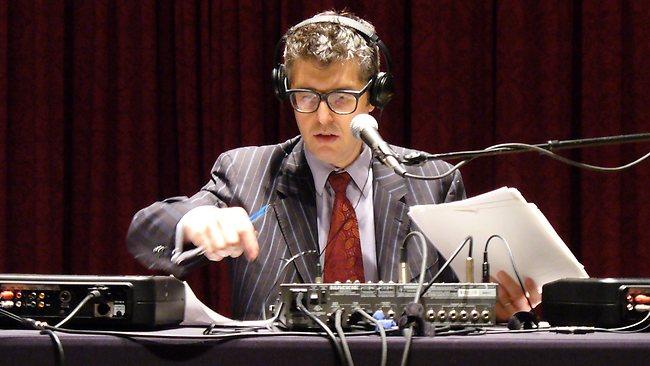This American folk life, as broadcast by Ira Glass
IRA Glass's public radio program has made him into an unlikely international star.

IT'S a gloomy morning in the Manhattan neighbourhood of Chelsea and I'm about to meet one of the world's most unlikely heartthrobs, founder and host of cult public radio show This American Life, Ira Glass.
He may be 52, gangly, with tousled salt-and-pepper hair and Buddy Holly-style geek glasses, but Glass is a bona fide pin-up for the intelligentsia. The nerd's George Clooney, if you will. Not so much for his looks (although his brand of rumpled rakishness certainly isn't too hard on the eyes) but for his unflagging devotion to old-fashioned storytelling, something he has been doing on public radio for 30 years now.
This American Life, the weekly radio show he founded in 1995 in Chicago, takes listeners on an hour-long journey to find the extraordinary in stories of ordinary Americans and was instrumental in reviving what most considered a dying art form. Today the show has 1.8 million radio listeners on more than 500 stations across the US (it is broadcast in Australia on ABC Radio National), along with 600,000 fans who download the podcast each week.
In January the charismatic, erudite Glass will take his show on the road, visiting Australia for a five-city tour kicking off on January 11 at the Sydney Festival. Reinventing Radio: An Evening with Ira Glass will re-create This American Life on stage, using clips, music and narration from Glass.
He's already making an impression. The Sydney Festival's Facebook page is inundated with fans hyperventilating over the prospect of seeing their radio hero in the flesh. Tickets for the show sold out within an hour. ("I heard that too," Glass says with a wide-eyed, "Can you believe it?" look when I later mention this. "It was shocking, really, really shocking.")
The offices, on the 11th floor of a nondescript pre-war brick building in one of the more down-at-heel parts of Chelsea, are about what you'd expect from a public radio station's headquarters: slightly shabby decor, a whiteboard scrawled with ideas and things to be done, young idealistic-looking types working hard in their cubicles.
The windowsill is crammed with awards: among other accolades, Glass was the recipient of the Edward R. Murrow Award for outstanding contributions to public radio in 2005. (He's also credited with launching the career of David Sedaris, after inviting the writer on to NPR to read essays; as it happens, Sedaris is also touring Australia in January.) The walls are hung with hand-drawn cartoons and notes. "I Saved Public Radio!" trumpets one; "Your show is so young and with it - is NPR the best venue for you???" reads another.
A few minutes after I arrive Glass comes rushing in, shaking my hand distractedly and trying to clear off a space to sit in his office. He looks at least a decade younger than his biological age, and sounds a little like a young Woody Allen, his delivery lightning-fast and kind of nasally. It's this eminently familiar voice that heralds fans' favourite hour of the week, when Glass hits the airwaves to deliver his now famous phrase, "From WBEZ Chicago, it's This American Life, distributed by Public Radio International. I'm Ira Glass."
This will be Glass's first visit to Australia. "My impressions are very sparse and utterly corny and ill-informed and would be embarrassing to share," he declares. "I feel like everything I know about Australia is ridiculous and there's no reason to go into it."
He then proceeds to launch into a stream-of-consciousness moment about kangaroos: "I'm curious to see what a living kangaroo is like. It's been described to me that you'll come out to your car in the parking lot and there will be a kangaroo standing there. And we have a big kangaroo connection because our dog . . . ah, never mind. Maybe I'll come back to it." He flashes his trademark coy grin. (We never do come back to the dog-kangaroo connection, alas.)
Glass is such a natural-born storyteller he needs to will himself to stay on topic rather than bounding after the scent of a new thread like some overenthusiastic puppy.
"Can I just ask you about something?" he leans in eagerly before I can get a question in. "Another Australian reporter who just moved here, she told me it strikes her that Americans are really different, in the following way. She finds herself in conversation with people and they'll produce stories from their childhood with her and each other, as if to say, 'This is the person I am.' They have, like, a fable from their childhood, or a bunch of them.
"She thought that seemed particularly American, and I said, 'People in other countries don't do that? It doesn't seem that unusual.' She said, well, maybe once you really got to know someone, but with Americans there's an easy notion of 'Here's my story, let me tell you my story.' Have you noticed that?"
This is life inside Glass's brain. He's genuinely fascinated by minutiae, the little things that make us human, the threads that make a story worth telling. Part of the genius of This American Life is the way the show borrows the conceits of fiction - plot, drama, character arcs, conflict and resolution - and applies them to real-life stories. Perhaps that's why so many people are keen to rush the box office for the chance to see this man effectively do a radio show on stage.
"Basically what I'm going to do [during the tour] is a talk about the radio show, about what we are doing that is different to everyone else on the radio right now," he says. "And why we do it that way and how we do it -- basically it's an excuse to play a lot of funny clips."
The format of the show, as he tells it, will be "kind of wandering around the stage with an iPad, which is set up like a mixer so I can play quotes and music and re-create the sounds of the radio show around me as I speak. It's wonderfully hi-tech, actually."
You may expect a proponent of such an anachronistic medium as radio to reject or at least ignore new media, but not so Glass. The internet has opened up a whole new realm for the show, and the team enthusiastically embraces its possibilities.
"The aesthetics of the internet is, I'm sitting here and talking directly to you, and it's just you and me just speaking in a very personal way," he says. "Our show naturally fits what people are looking for on the internet, and that's made the audience bigger, which is a real boon."
Glass does lament that his nonstop schedule precludes him from having time to consume much other media. He claims the only website he reads these days is the one edited by his wife, Anaheed Alani, whom he met in Chicago in 2005.
Naturally, there's a story.
"She heard me do a local show with a friend that nobody really listens to," Glass recalls. "My friend has a hugely argumentative personality and she heard me constantly being the peacemaker. She comes from a family where there's a lot of loud, bull-headed people and she thought, 'I understand that guy.' " The two moved to New York together the following year. (Sorry, aspiring Mrs Glasses.)
It may sound like a tough ask for Australians to embrace a show whose content is so inherently parochial - as the name suggests, the stories are exclusively about Americans - but the episodes have a striking universality, whether parsing the economic crisis (complete with a specially commissioned Broadway song) or uncovering a small-town scandal that brings down a corrupt judge.
The show can be funny, as with the wonderful episode in which three narrators described a time when their reputation was destroyed, or poignant (the same episode, in which a politician recounted how a false accusation of child pornography ruined his life). The subject can be something as benign as chicken farming or as politically loaded as the recent child-sex scandal that rocked Penn State University. The show covered it by juxtaposing shell-shocked locals' reactions with a years-old show exploring the culture of partying on campus.
"The most emotional stories on whatever subject will get the most reaction, no question," Glass says. "Or the ones where you feel a sense of, 'That's just wrong.' "
While he considers himself a politically engaged person, Glass doesn't find it difficult at all to remain nonpartisan. (He actually bursts out laughing at the idea.)
"Fortunately both political parties in this country are run by politicians who act like crazy people," he deadpans. "I feel like the mission of the show is not primarily political; the mission is to present stories that have much more feeling and emotion and humour than other things on the radio. And then what we like to do with politics is deal with it in a way that will have more of a stake in feeling."
One show, for instance, covered the rise of the grassroots political movement known as the Tea Party in a way other media outlets had avoided.
"We consciously looked for a story where it would be possible to see things from the point of view of people within the movement," Glass says. "We found a story about a drama within a Tea Party chapter, and basically it was about two best friends who over the course of about a year came to really different political conclusions about how to move their party forward. They started out best friends and ended up not speaking. A lot of drama happened between them."
Glass claims the segment worked simply because "It was old-school storytelling where you invest in the two characters and you follow them, and I think we got at something that was really different. There was something admirable about them that wasn't in the reporting other people were doing. We were consciously trying to understand something from the inside."
This ability to find empathy and shared common ground in its subjects is part of what sets apart This American Life. The best of the stories play out like mini-movies, or occasionally Greek dramas. While to a layperson the mechanics of a good story may seem mysterious and opaque, for the makers of This American Life it's a known science.
Glass lists the requirements off on his fingers. "It has to be surprising, first and foremost. The plot has to be pretty wonderful, with plot twists all the way through. There has to somebody you can relate to, and it has to drive you towards some thought about the world you haven't considered before."
At the show's inception, the motto was "Nobody famous, and nothing you've seen or heard anywhere else". (It was also advertised, self-deprecatingly, as "A public radio show for people who hate public radio. A documentary show for people who hate documentaries.")
"We wanted to apply the tools of journalism to things so small they'd never be dealt with by journalists anywhere else," Glass says. "And it seemed like there was a broad territory within that of documenting people's lives. But after you do that for many years it becomes fun to take on the news.
"We did a show last May in which the theme was, 'Things that happened this week'. It was our attempt at a news show. We ended up having to find really good characters and scenes really fast . . . it was a sprint instead of a marathon."
I sense Glass getting close to needing to sprint himself - that whiteboard to-do list isn't going to finish itself - so I throw just one more thought his way. So many of This American Life's fans seem to feel such a personal connection with the stories, and with the show itself. What is it that keeps them tuning in?
Glass doesn't hesitate. "I just think that's radio," he answers decisively. "I think if there's something you like on the radio it feels really personal. Radio, when it's working, feels like it's talking just to you."
With that, he flashes that disarmingly coquettish grin one last time and is gone, rushing headlong into the next chapter of his own fascinating American life.
Reinventing Radio: An Evening with Ira Glass, Sydney Festival, January 11 (two shows); Brisbane, January 12; Perth, January 13; Adelaide, January 15; Melbourne, January 16.
SINGULAR SENSATIONS
STARS fleeing a northern hemisphere winter in the next few months include:
- Rocker PJ Harvey, tours from January 13
- Playwright Tom Stoppard, Melbourne, December 16; Sydney, December 17
- Humorist David Sedaris, tours from January 11
- Pop legend Rod Stewart, tours from February 4
- Clown James Thierree, Perth, February 18-26; Adelaide, March 1-6
- Composer Ennio Morricone conducts his film music, Perth, February 26; Adelaide, March 2
- Songstress Jane Birkin tours from March 16
- Violinist Anne-Sophie Mutter, Sydney, March 30


